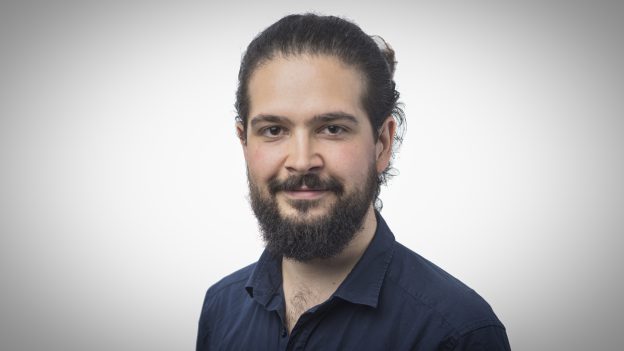Unsere vernetzte Welt verstehen

Guide zum Internet Governance Forum (IGF) 2019
Im November kommt das globale Internet Governance Forum (IGF) der Vereinten Nationen zum ersten Mal nach Deutschland. Unter dem Motto „One World. One Net. One Vision“, diskutieren Forscher*innen und Politiker*innen aus der ganzen Welt über die zentralen rechtlichen, politischen, sozialen und technischen Fragen des Internets. Das Alexander von Humboldt Institut für Internet und Gesellschaft (HIIG) und Leibniz-Institut für Medienforschung | Hans-Bredow-Institut (HBI), sind durch ihre Forscher*innen auf dem Forum vertreten. Bei dieser riesigen Konferenz ist es gar nicht so einfach, sich einen Überblick zu verschaffen. Wir haben uns in den beiden Instituten umgehört und stellen hier die wichtigsten Events zwischen dem 25. und 29. November vor.
Overview of our recommendations
Pre-Events: Mo, 25.11.
9:00-10:30 Global Citizens‘ Debate on the Future of Internet
10:35-18:00 GIGANET
13:05-15:05 NETmundial+5: The Legacy and Implications for Future Internet Governance
17:05-18:15 How is life in the digital age treating us? Opportunities and risks for people’s well-being
IGF-Day I: Tue, 26.11.
10:45-11:45 OF13 Human Rights & AI Wrongs: Who Is Responsible?
18:00-20:00 Many Worlds. Many Nets. Many Visions. – Critical Voices, Visions and Vectors for Internet Governance
IGF-Day II: Wed, 27.11.
9:00-11:00 Applying Human Rights and Ethics in Responsible Data Governance and Artificial Intelligence
11:30-13:00 Youth in IG for Internet Ethics & Digital Inclusion
15:00-16.30 Data-Driven Democracy: Ensuring Values in the Internet Age
IGF-Day III: Thu, 28.11.
9:30 – 11:00 Hacking Hate Speech Online: A multi-stakeholder approach
15:00-16:30 Data Governance for Smarter City Mobility
16:40-18:10 Let There Be Data – Exploring Data as Public Good
IGF-Day IV: Fri, 29.11.
9:30-11:00 Internet De-tox: A Fail-proof Regimen to End Online Sexism
9:30-11:00 Accessing the Role of Algorithms in Electoral Processes

Copyright: Estrel Berlin/Manuel Frauendorf
Why you shouldn’t miss these events
Pre-Events: Monday, 25.11.
9:00-10:30 Global Citizens‘ Debate on the Future of Internet
Venue: Estrel Hall C, Estrel Berlin, Sonnenallee 225, 12057 Berlin
Why you shouldn’t miss this event: Go local! What do the humans of this world think about the internet? Do they consider themselves threatened by disinformation? How do they create their own digital identity? What do they know about the internet? These are the questions the worldwide survey of Missions Publiques addresses. I am excited to get an insight into the “local internets”.
Recommended by Matthias C. Kettemann, Head of the Research Programme ”Regulatory Structures and the Emergence of Rules in Online Spaces” at the Leibniz-Institute for Media Research | Hans-Bredow-Institute.
10:35-18:00 GIGANET
Venue: Convention Hall I, Estrel Berlin, Sonnenallee 225, 12057 Berlin
Why you shouldn’t miss this event: Scientists from all over the world are engaged in internet research and ask themselves: How can we design Internet Governance in a sustainable way? Several of them will be presenting their current research at this workshop by GIGANET, a global network of internet researchers. A cocktail of knowledge in preparation of the IGF – don’t miss it!
Recommended by Matthias C. Kettemann, Head of the Research Programme ”Regulatory Structures and the Emergence of Rules in Online Spaces” at the Leibniz-Institute for Media Research | Hans-Bredow-Institute.
13:05-15:05 NETmundial+5: The Legacy and Implications for Future Internet Governance
Venue: Room V, Estrel Berlin, Sonnenallee 225, 12057 Berlin
Why you shouldn’t miss this event: It has already been five years since representatives of governments and stakeholders from around the world gathered in São Paulo, Brazil to negotiate and adopt the NETmundial Multistakeholder Statement on global internet governance. At the time, it was a bottom-up, open and participatory process, “involving thousands of people from governments, private sector, civil society, technical community, and academia from around the world”. At this year’s IGF the NET mundial+5 opens the floor to all participants. Everyone is invited to discuss human rights and shared values, procedural guidelines concerning the conduct of multistakeholder internet governance as well as the goal of promoting a unified and unfragmented internet. The organisers are critically asking: Does the NETmundial offer lessons and does it have normative relevance to emerging governance challenges? Or should we just regard it merely as a one-off event of no lasting significance? I’m excited to see what has been achieved in the past five years.
Recommended by Florian Lüdtke, Head of Communications at the Alexander von Humboldt Institute for Internet and Society (HIIG).
How can we turn online challenges into opportunities making sure all citizens are benefiting from a healthy digital environment?
Alina Wernick (HIIG)
17:05-18:15 How is life in the digital age treating us? Opportunities and risks for people’s well-being
Venue: Room III, Estrel Berlin, Sonnenallee 225, 12057 Berlin
Why you shouldn’t miss this event: During this pre-event, participants will explore current online trends and the growing range of threats to the global internet, such as online challenges (e.g. Momo and Blue Whale Challenge), internet ethics, fake news, hate speech, human rights and security. Moreover, participants will discuss how to turn challenges into opportunities by making sure all citizens are benefiting from a healthy digital environment. This pre-event will provide a substantial overview of issues relevant under the IGF Theme Security, Safety, Stability and Resilience, while drawing up on related issues of data governance (e.g. data privacy, digital identity) and digital inclusion (e.g. digital literacy).
Recommended by Alina Wernick, Researcher on Data, Actors and Infrastructures at the Alexander von Humboldt Institute for Internet and Society (HIIG).
IGF-Day I: Tues, 26.11.
10:45-11:45 OF13 Human Rights & AI Wrongs: Who Is Responsible?
Venue: Convention Hall I, Estrel Berlin, Sonnenallee 225, 12057 Berlin
Why you shouldn’t miss this event: The impact of Artificial Intelligence (AI) on human rights and the viability of our democratic processes became starkly visible during the Cambridge Analytica scandal and has been increasingly debated since. Countries committed to protecting human rights must ensure that those who benefit from developing and deploying digital technologies and AI are effectively held responsible for their risks and consequences. This open forum addresses the following questions: Who bears responsibility for the adverse consequences of advanced digital technologies, such as AI? What consequences stem from the fact that most data processing infrastructures are in private hands? This is going to be an exciting open forum with experts that you should not miss. We also expect the experts to also discuss the recommendations of the recently leaked Report of the Data Ethic Commission of the German Federal Government, that inter alia calls for new supervisory authorities, an algorithms regulation at EU level and a pluralism obligation for social media gatekeepers.
Recommended by Anna Sophia Tiedeke, Junior Researcher on “Regulatory Structures and the Emergence of Rules in Online Spaces” at the Leibniz-Institute for Media Research | Hans-Bredow-Institute (HBI).
“We are creating a world that all may enter without privilege or prejudice accorded by race, economic power, military force, or station of birth.”
Declaration on the Independence of Cyberspace
18:00 – 20:00 Many Worlds. Many Nets. Many Visions. – Critical Voices, Visions and Vectors for Internet Governance
Venue: HIIG, Französische Straße 9, 10117 Berlin
Why you shouldn’t miss this event: The Internet Governance Forum 2019 in Berlin is committed to „One net, one world, one vision“. This event begs to differ. The internet we have does not fulfill the emancipatory promise some have ascribed to it: a medium to change the world and end all injustice. The internet has changed the world but it has fundamentally destabilised key societal power differentials. We have invited experts and activists from all over the world, representing all stakeholder groups to present their ideas on how the internet governance discussion should be further developed regarding marginalized groups and communities. Join us in exploring the many possible pathways to the internet of the future!
Recommended by Katharina Mosene, Researcher and Head of Event Cooperations at the Leibniz-Institute for Media Research | Hans-Bredow-Institute (HBI). This event is organised by Matthias C. Kettemann and Katharina Mosene.
IGF-Day II: Wed, 27.11.
9:00-11:00 Applying Human Rights and Ethics in Responsible Data Governance and Artificial Intelligence
Venue: Main Hall, Estrel Berlin, Sonnenallee 225, 12057 Berlin
Why you shouldn’t miss this event: This sessions tackles key questions of the possibilities and necessities of regulating Artificial Intelligence (AI). The opportunities of AI and/or automated decision making systems seem to be limitless. However, up to now, it remains unclear as to how the new technology can and should take into account human rights and ethical principles. This interesting session presents different international perspectives and approaches regarding the current debate on AI and human rights.
Recommended by Anna Sophia Tiedeke, Junior Researcher on “Regulatory Structures and the Emergence of Rules in Online Spaces” at the Leibniz-Institute for Media Research | Hans-Bredow-Institute (HBI).
Which measures are necessary for young Internet Governance-initiatives in order to include marginalised groups in Internet Governance processes?
Katharina Mosene (HIIG | HBI)
11:30-13:00 Youth in IG for Internet Ethics & Digital Inclusion
Venue: Room IV, Estrel Berlin, Sonnenallee 225, 12057 Berlin
Why you shouldn’t miss this event: How can initiatives lead by the youth push for the rights of marginalized adolescents in Internet Governance (IG)? How can they create an environment which allows adolescents to take part in IG processes? Which measures are necessary for young IG-initiatives in order to include marginalized groups in these processes? How can the inclusion of marginalized groups further the developments of online ethics and politics? These and many more questions will be discussed on this panel which will offer an interesting glimpse into possible future directions of Internet Governance.
Recommended by Katharina Mosene, Researcher and Head of Event Cooperations at the Leibniz-Institute for Media Research | Hans-Bredow-Institute.
15:00-16.30 Data-Driven Democracy: Ensuring Values in the Internet Age
Venue: Room II, Estrel Berlin, Sonnenallee 225, 12057 Berlin
Why you shouldn’t miss this event: How are technological, economical, ethical and political considerations connected to legal and regulatory frameworks in data-driven technologies? An interesting debate about the future of regulating big data and technology.
Recommended by Katharina Mosene, Researcher and Head of Event Cooperations at the Leibniz-Institute for Media Research | Hans-Bredow-Institute.
IGF Day III: Thu, 28.11.
9:30 – 11:00 Hacking Hate Speech Online: A multi-stakeholder approach
Venue: Room V, Estrel Berlin, Sonnenallee 225, 12057 Berlin
Why you shouldn’t miss this event: Online hate speech is a growing threat to the global internet and its users. This panel will put the role of governments, the private sector and civil society in combating online hate speech at the center of the debate. Now, more than ever, the establishment of a multi-stakeholder dialogue between governments, civil society organizations and the corporate sector is necessary in order to strengthen shared principles, norms, rules and decision-making processes in the fight against online hate speech. A more than important topic which needs to be tackled.
Recommended by Katharina Mosene, Researcher and Head of Event Cooperations at the Leibniz-Institute for Media Research | Hans-Bredow-Institute.

15:00-16:30 Data Governance for Smarter City Mobility
Venue: Room V, Estrel Berlin, Sonnenallee 225, 12057 Berlin
Why you shouldn’t miss this event: How should data in Smart Cities be governed in order to foster the creation and delivery of effective, innovative and sustainable mobility and transportation services for citizens, while respecting their privacy and other fundamental rights?
Recommended by Katharina Mosene, Researcher and Head of Event Cooperations at the Leibniz-Institute for Media Research | Hans-Bredow-Institute.
16:40-18:10 Let There Be Data – Exploring Data as Public Good
Venue: Room IV, Estrel Berlin, Sonnenallee 225, 12057 Berlin
Why you shouldn’t miss this event: Data is the new oil. Many innovative technological solutions like AI-based applications rely on massive amounts of data. At the same time there are inequalities in access and representation attached to them, these may be economical, cultural or geographical. Learning about good practices for the development of digital public goods and different governance models especially for data commons from different countries and stakeholders will make this workshop an exciting experience for me.
Recommended by Kai Gärtner, Computer Scientist at the Alexander von Humboldt Institute for Internet and Society (HIIG).
IGF Day IV: Fri, 29.11.
9:30-11:00 Internet De-tox: A Fail-proof Regimen to End Online Sexism
Venue: Room V, Estrel Berlin, Sonnenallee 225, 12057 Berlin
Why you shouldn’t miss this event: The aim of this panel is to create a digital environment which allows women to express themselves freely without being afraid of experiencing violence. Moreover, misogyny is closely tied to women’s cultural, religious, ethnic and sexual identities. If these groups withdraw from democratic discourses because they fear violence, we all lose.
Recommended by Katharina Mosene, Researcher and Head of Event Cooperations at the Leibniz-Institute for Media Research | Hans-Bredow-Institute.
9:30-11:00 Accessing the Role of Algorithms in Electoral Processes
Venue: Room I, Estrel Berlin, Sonnenallee 225, 12057 Berlin
Why you shouldn’t miss this event: Make facts relevant again! The role of algorithms in social networks and their influence on political campaigns such as Brexit or presidential elections in the USA or Brazil has been hotly debated over the past few years. This workshop aims to find some proposals for legal, political and governance instruments in order to deal with the challenge of regulating the use of algorithms in political campaigns.
Recommended by Kai Gärtner, Computer Scientist at the Alexander von Humboldt Institute for Internet and Society (HIIG).
The entire programme can be found here.
Thanks for the contributions by:
Kai Gärtner is Computer Scientist at Alexander von Humboldt Institut for Internet and Society (HIIG).
Dr. Matthias C. Kettemann is Head of the Research Programme ”Regulatory Structures and the Emergence of Rules in Online Spaces” at Leibniz-Institute for Media Research | Hans-Bredow-Institute (HBI).
Florian Lüdtke is Head of Communications at Alexander von Humboldt Institut for Internet and Society (HIIG).
Katharina Mosene is Researcher and Head of Event Cooperations at Leibniz-Institute for Media Research | Hans-Bredow-Institute (HB).
Anna Sophia Tiedeke is Junior Researcher on “Regulatory Structures and the Emergence of Rules in Online Spaces” at Leibniz-Institute for Media Research | Hans-Bredow-Institute (HBI).
Alina Wernick is Researcher on Data, Actors and Infrastructures at Alexander von Humboldt Institut for Internet and Society (HIIG).
Dieser Beitrag spiegelt die Meinung der Autorinnen und Autoren und weder notwendigerweise noch ausschließlich die Meinung des Institutes wider. Für mehr Informationen zu den Inhalten dieser Beiträge und den assoziierten Forschungsprojekten kontaktieren Sie bitte info@hiig.de

Jetzt anmelden und die neuesten Blogartikel einmal im Monat per Newsletter erhalten.
Plattform Governance
Raus aus dem Digitalisierungsstau: Data Governance bringt Städte und Gemeinden auf die digitale Überholspur
Der Data Governance Wegweiser unterstützt Verwaltungen, digitale Lösungen effektiv umzusetzen.
Netzecho: Reaktionen auf die Tagesschau in Einfacher Sprache
Seit 2024 gibt es die Tagesschau in Einfacher Sprache. Wie wird das neue Nachrichtenformat von Nutzer*innen im Internet diskutiert?
Chancen gegen Einsamkeit: Wie Pflegeeinrichtungen das Quartier vernetzen
Was hilft gegen Einsamkeit im Alter? Pflegeeinrichtungen schaffen neue Räume für Gemeinschaft und digitale Teilhabe.





